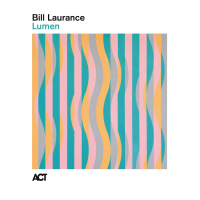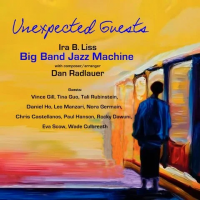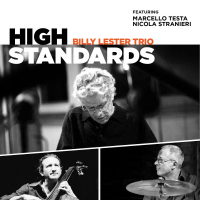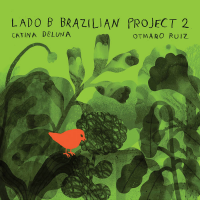Home » Jazz Articles » Multiple Reviews » Alice Coltrane: The Flowering of Astral Jazz
Alice Coltrane: The Flowering of Astral Jazz


Alice Coltrane
piano1937 - 2007

Pharoah Sanders
saxophone, tenor1940 - 2022
The style emerged following saxophonist

John Coltrane
saxophone1926 - 1967
Astral jazz continued in full bloom until the mid-1970s, when, in hands other than those of Coltrane and Sanders, it degenerated into clichЁҰ and, ultimately, into a blissed-out sub-genre of the fusion movement.
The 2-on-1 reissues are Coltrane's Huntingdon Ashram Monastery (1969), Universal Consciousness (1971), World Galaxy (1972) and Lord Of Lords (1972), and Sanders' Wisdom Through Music (1972) and Village Of The Pharoahs (1973). All these albums have previously been rereleased, but their availability has been patchy and often on relatively expensive, limited editions.
Unlike some of the tackily produced reissues which have been visited on the Impulse! catalogue by a succession of corporate owners since the 1970s, the 2-on-1 series has been put together with care. The LPs' original gatefold sleeves are not used, but they are reproduced in their entirety in the 12-page booklets included with the discs. You may need a magnifying glass to read the original, lengthy liner notes for the Coltrane discs, but read them you can (and it is worth the trouble).
As most of the original LPs had playing times of just over 30 minutes, there is no problem with putting two of them on one disc, although why the series producers have not programmed them all chronologically is a bit of mystery.
Given such wonderful music, it is a mystery we can live with.
 Alice Coltrane
Alice ColtraneHuntington Ashram Monastery/World Galaxy
Impulse!
2011 (1969, 1972)
The first full flowering of astral jazz came with Sanders' Tauhid (1967). Alice Coltrane's first wholly astral recording, Ptah, The El-Daoud, which featured Sanders, was released in 1970, following the harp-rich but otherwise quite straight-ahead LPs A Monastic Trio (1968), which featured Sanders on three tracks, and Huntingdon Ashram Monastery.
Like its predecessor, Huntington Ashram Monastery was made with a trio: Coltrane on piano and harp, with, this time out,

Ron Carter
bassb.1937

Rashied Ali
drums1935 - 2009
Aside from the funky, gospel-tinged closing track, "Jaya Jaya Rama," based on a Hindu devotional chant, Huntington Ashram Monastery suggests rather than delivers astral jazz. The track titles are redolent of Hindu mysticism (except for "IHS, which stands for "I Have Suffered"), ostinatos are present, three of the six tracks feature Coltrane on harp, and Ali is heard on bells and wind chimes in addition to kit drums. But the root of the music is straight-ahead. In her liner notes, Coltrane wrote that she was especially pleased with Carter's playing, noting that he was "harmoniously attuned to higher chord progressions," and implying that he reconnected her with a tradition going back to her first influences on piano,

Bud Powell
piano1924 - 1966

Thelonious Monk
piano1917 - 1982
It is a beautiful, sumptuous album, but the full-on astral experience comes with World Galaxy. This was Coltrane's second outing with strings, following Universal Consciousness (reviewed below). On Universal Consciousness, Coltrane collaborated with

Ornette Coleman
saxophone, alto1930 - 2015

Leroy Jenkins
bass, electric1932 - 2007
Elsewhere,

Frank Lowe
saxophone, tenor1943 - 2003

Reggie Workman
bassb.1937

Ben Riley
drums1933 - 2017
World Galaxy is transporting stuff—and the four pieces which precede "A Love Supreme" make that much maligned track sound perfectly logical.
 Alice Coltrane
Alice ColtraneUniversal Consciousness/Lord Of Lords
Impulse!
2011 (1971, 1972)
Universal Consciousness and Lord Of Lords are respectively the first and the third albums Coltrane made with strings for Impulse!. And like the better known Ptah, The El Daoud and 1971's Journey In Satchidananda (like Ptah featuring Pharoah Sanders), they too come with the full panoply of astral jazz signature elements: hypnotic ostinatos, swirling harp glissandos, trippy Wurlitzer, chanted vocals, tamboura, bells and chimes. The foundations are provided by bassist

Jimmy Garrison
bass, acoustic1934 - 1976

Jack DeJohnette
drumsb.1942
Clifford Jarvis
drumsb.1941

Charlie Haden
bass, acoustic1937 - 2014
On Universal Consciousness, Coltrane uses strings on three tracks (arranged in collaboration with Ornette Coleman). Two other tracks are duets with Ali, and one is by the trio of Coltrane, Garrison and Jarvis. The first two tracks (including the with-strings "Universal Consciousness") are, unusually for Coltrane in this period, up-tempo and urgent. The remaining four (including the with-strings "Oh Allah" and "Hare Krishna," which also feature tamboura player Tulsi) possess Coltrane's characteristically serene feel.
As noted above, Coltrane's string arranging style was not fully formed on Universal Consciousness, but passages on "Hare Krishna" hint at the splendors that would come with World Galaxy and Lord Of Lords.
It is worth getting the magnifying glass out for the liner notes, on which Coltrane writes revealingly about the spiritual influences informing her music at the time: Hindu, Christian, Zoroastrian, Buddhist, Taoist and Islamic.
And keep the glass out for Lord Of Lords, which features a string orchestra on all five tracks. About the genesis of track three, which uses rearranged excerpts from The Firebird by Igor Stravinsky (1882-1971), Coltrane writes: "On March 20, 1972, I was blessed with the good fortune of receiving a visitation from the great master composer...After a warm and intimate discussion on the subject of music, he said, 'I wanted you to receive my vote....'" Stravinsky goes on to hand Coltrane a vial "of clear, colorless liquid," which, like her namesake in Lewis Carroll's Alice's Adventures In Wonderland, she swallows.
It is easy to sneer at Coltrane's belief system, but she was sincere in her views, never tried to force them on to other people and, most importantly for us, was inspired by them to create some of the most uplifting jazz of her era. Like The Firebird itself, most of Lord Of Lords is gigantic in conception, a quality well set off by the closing tune, the wistful gospel song "Going Home" (better known to many people via the composer Anton Dvo?Ёўk, who used it in the "Largo" of his New World Symphony).
Not so much astral, as galactic jazz.
 Pharoah Sanders
Pharoah SandersVillage Of The Pharoahs/Wisdom Through Music
Impulse!
2011 (1973, 1972)
Unlike Alice Coltrane, who passed in 2007, tenor and soprano saxophonist Pharoah Sanders, born in 1940, is still with us, still recording and still commanding the concert stage (check the YouTube clip with bassist

Bill Laswell
bassb.1955
Sanders is most widely known for the album Karma (1969) and its hit track, "The Creator Has A Master Plan," which took up the first side of the original release. But his Impulse! albums were consistent in quality, and Village Of The Pharoahs and Wisdom Through Music, sequenced here in reverse chronological order, deserve to be heard every bit as much.
Unlike Sanders' other Impulse! albums, which were produced by either Bob Thiele or Ed Michel, 1972's Wisdom Through Music was produced by Lee Young, the brother of saxophonist

Lester Young
saxophone1909 - 1959

Nat King Cole
piano and vocals1919 - 1965
The music, however, is sublime. The romping "High Life," which opens, establishes the album's mood, which is upbeat and celebratory. Sanders' vocalized saxophones are at their most vibrant (standouts are his tenor on "High Life" and soprano on "Selflessness"); in addition to

Norman Connors
drumsb.1947
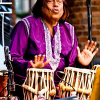
Badal Roy
tablasVillage Of The Pharoahs, released in 1973, comes from three separate sessions, with a September, 1973, date producing the core album: the three-part title track together with "Myth," which follows, and the closer, "Went Like It Came." On these tracks Sanders (who plays soprano except on "Went Like It Came," where he uses tenor), is accompanied by a percussion and tamboura-rich band, which also includes pianist

Joe Bonner
piano1948 - 2014
"Village Of The Pharoahs Parts 1-3" and "Myth" actually comprise one unbroken track, whose division into four parts is on paper only and down to an initiative by producer Ed Michel: he realized that Sanders would increase his royalties if he billed his often side-long tracks as shorter, "separate" titles. "Went Like It Came" is lighthearted hard bop given a gospel flavor by Brown's vocals. It has an impromptu vibe which suggests it was added to the session to fill out unused studio time.
The remaining tracks, "Mansion Worlds" (recorded in 1971) and "Memories Of Lee Morgan" (1972), present Sanders in front of smaller groups including drummer Norman Connors and twin-bassists

Cecil McBee
bassb.1935

Stanley Clarke
bassb.1951
Garth Webber
guitarTwo brilliant albums which deserve to be more widely heard—and there is plenty more astral Sanders on Impulse! which, it is to be hoped, will be reissued in any future 2-on-1 batches.
Tracks and Personnel
Huntington Ashram Monastery/World Galaxy
Tracks: Huntington Ashram Monastery: Huntington Ashram Monastery; Turiya; Paramahansa Lake; Via Sivanandagar; IHS; Jaya Jaya Rama. World Galaxy: My Favourite Things; Galaxy Around Olodumare; Galaxy In Turiya; Galaxy In Satchidananda; A Love Supreme.
Personnel: Huntington Ashram Monastery: Alice Coltrane: harp (1-3), piano (4-6); Ron Carter: bass; Rashied Ali: drums. World Galaxy: Alice Coltrane: piano (2), organ (1, 4, 5), harp (1, 3-5), tamboura (4), percussion; Frank Lowe: tenor saxophone, soprano saxophone, percussions; Reggie Workman: bass; Ben Riley: drums; Elayne Jones: tympani; Swami Satchidananda: voice (5); Leroy Jenkins: solo violin (5); string orchestra.
Universal Consciousness/Lord Of Lords
Tracks: Universal Consciousness: Universal Consciousness; Battle At Armageddon; Oh Allah; Hare Krishna; Sita Ram; The Ankh Of Amen-Ra. Lord Of Lords: Andromeda's Suffering; Sri Rama Ohnedaruth; Excerpts From The Firebird; Lord Of Lords; Going Home.
Personnel: Universal Consciousness: Alice Coltrane: organ, harp; Jimmy Garrison: bass (1, 3-5); Jack DeJohnette: drums (1, 3, 4); Rashied Ali: drums (2, 6), wind chimes (6); Clifford Jarvis: drums (4, 5), bells (5), percussion (5); Tulsi: tamboura (4, 5); string section (1, 3, 4). Lord Of Lords: Alice Coltrane: piano, organ, harp, tympani, percussion; Charlie Haden: bass; Ben Riley: drums, percussion; string orchestra.
Village Of The Pharoahs/Wisdom Through Music
Tracks: Village Of The Pharoahs: Village Of The Pharoahs Parts 1-3; Myth; Mansion Worlds; Memories Of Lee Morgan; Went Like It Came. Wisdom Through Music: High Life; Love Is Everywhere; Wisdom Through Music; The Golden Lamp; Selflessness.
Personnel: Village Of The Pharoahs: Pharoah Sanders: tenor saxophone (7), soprano saxophone (1-6), bells (5, 6), percussion (1-3, 7), vocals (1-4, 7); Art Webb: flute (6); Joe Bonner: piano, shakuhashi flute (1-3), percussion (1-3), vocals (1-3); Calvin Hill: bass (1-4,7); Cecil McBee: bass (5, 6); Stanley Clarke: bass (5, 6); Jimmy Hopps: drums (1-3, 7); Norman Connors: drums (5, 6); Lawrence Killian: congas (1-3, 5, 7), percussion (5), vocals (4); Kenneth Nash: sakara ceramic drums (1-3), Indian murdungom drums (1-3), percussion (1-4, 7), whistles (4); Kylo Kylo: tamboura (1-3), percussion (1-4, 7); Sedatrius Brown: percussion, vocals (1-4, 7); Hannibal Marvin Peterson: percussion (5). Wisdom Through Music: Pharoah Sanders: soprano saxophone, tenor saxophone, flute; James Branch: flute; Joe Bonner: piano; Cecil McBee: bass; Norman Connors: drums; Lawrence Killian: percussion; Mtume: percussion; Babal Roy: percussion.
Photo Credit
Photo courtesy Ascent
Tags
Comments
PREVIOUS / NEXT
Support All About Jazz
 All About Jazz has been a pillar of jazz since 1995, championing it as an art form and, more importantly, supporting the musicians who make it. Our enduring commitment has made "AAJ" one of the most culturally important websites of its kind, read by hundreds of thousands of fans, musicians and industry figures every month.
All About Jazz has been a pillar of jazz since 1995, championing it as an art form and, more importantly, supporting the musicians who make it. Our enduring commitment has made "AAJ" one of the most culturally important websites of its kind, read by hundreds of thousands of fans, musicians and industry figures every month.







 Buy Now
Buy Now




